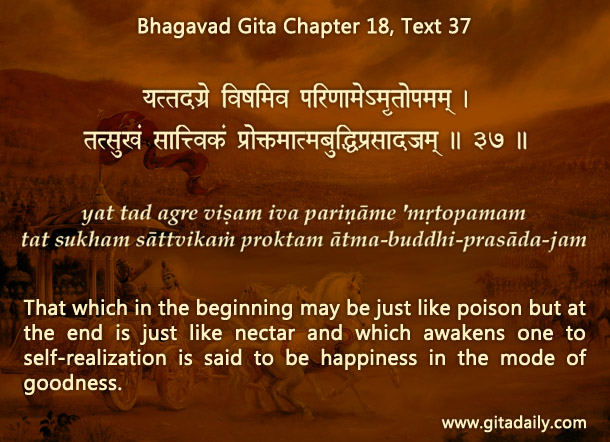How to endure phases of tastelessness in bhakti
When we start practicing bhakti yoga, we may expect to relish great joy because we are connecting with the one who is the source of all joy: the all-attractive supreme, Krishna. The Bhagavad-gita (09.02) assures that bhakti-yoga is joyful.
However, we may find that our bhakti practice is sometimes tasteless. Why is that? Because the taste in bhakti comes when we connect with Krishna, when we offer our consciousness to him in a mood of loving service. Unfortunately, our consciousness is presently contaminated by many impurities. Due to these impurities, we feel tempted by some worldly things, seeing them as sources of irresistible pleasure. Or we feel threatened by other worldly things, seeing them as sources of unbearable trouble. When we are thus tempted or threatened or otherwise distracted, our connection with Krishna gets interrupted, and so we can’t relish bhakti.
These impurities are our spiritual disease. And the cure for the disease is to somehow or the other connect with all-pure Krishna, for that connection will drive away the impurities. During this purificatory phase when we are striving to connect with Krishna, we need to see our bhakti practice as a medicinal dose. That is, we practice bhakti not for its taste, but for its effect.
If we thus keep practicing bhakti, we will be cleansed of our impurities and will start connecting with Krishna more steadily. By that connection, we will become better absorbed in him, thereby relishing devotion naturally, joyfully, eternally. Then the same medicinal dose will be revealed to be a nectar drink, or in the Gita’s poetic language, what tastes like poison initially will eventually taste like nectar (18.37).
One-sentence summary:
To endure phases of tastelessness in bhakti, treat it as a medicinal dose and it will duly transform into a nectar drink.
Think it over:
- Why do we go through phases of tastelessness in bhakti?
- What is our spiritual disease? What is its cure?
- To persevere through tasteless phases, how do we need to view our bhakti practices?
***
18.37: That which in the beginning may be just like poison but at the end is just like nectar and which awakens one to self-realization is said to be happiness in the mode of goodness.
To know more about this verse, please click on the image
Explanation of article:
Podcast:



Very Good lines to remember.We practice bhakti not for its taste, but for its effect.
Thanks Prabhu , Hare Krishna
Thanks for the specific appreciation. Happy to be of service.
what are the higher taste you got in your brahmacari life that has helped to go ahead in this arduos journey.
Primarily speaking and writing about Krishna.